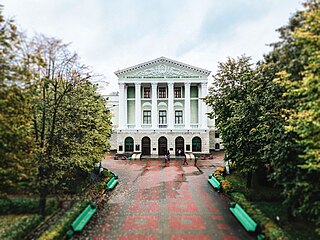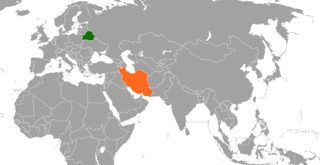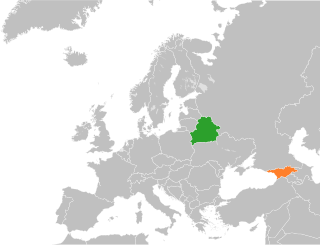| |||||
| Decades: | |||||
|---|---|---|---|---|---|
| See also: | |||||
Events in the year 2009 in Belarus .
| |||||
| Decades: | |||||
|---|---|---|---|---|---|
| See also: | |||||
Events in the year 2009 in Belarus .

The Government of the Republic of Belarus, which consists of the Council of Ministers of the Republic of Belarus, is the executive branch of state power in Belarus, and is appointed by the President of Belarus. The head of the Government is the President of Belarus, who manages the main agenda of the government and direct the ministers. The National Assembly of Belarus is the continuation of the Supreme Soviet of the BSSR and acts as the functioning parliament for Belarus.

Sergei Sergeevich Sidorsky was a Prime Minister of Belarus from 11 July 2004 to 28 December 2010. He was appointed Acting Prime Minister on July 11, 2004 to replace the dismissed Gennady Novitsky, and was confirmed as permanent Prime Minister on December 19, 2004.

The Union State of Russia and Belarus, officially also referred to as Union State, is a supranational union consisting of Belarus and Russia, with the stated aim of deepening the relationship between the two states through integration in economic and defence policy. Originally, the Union State aimed to create a confederation; however, both countries currently retain their independence.

The prime minister of the Republic of Belarus is the deputy head of government of Belarus. Until 1991, it was known as the Chairman of the Council of Ministers of the Byelorussian Soviet Socialist Republic as the head of the government of the constituent republic of the Soviet Union.

The president of the Republic of Belarus is the head of state and head of government of Belarus. The office was created in 1994 with the passing of the Constitution of Belarus by the Supreme Council. This replaced the office of Chairman of the Supreme Council as the head of state. The tasks of the president include executing foreign and domestic policy, defending the rights and general welfare of citizens and residents, and upholding the Constitution. The president is mandated by the Constitution to serve as a leader in the social affairs of the country and to act as its main representative abroad. The duties, responsibilities and other transitional clauses dealing with the presidency are listed in Chapter Three, Articles 79 through 89, of the Constitution.

Vyacheslav Frantsevich Kebich was a Belarusian politician and the first Prime Minister of Belarus from 1991 to 1994.

Belarusian National Technical University (BNTU) is the major technical university in Belarus.
Gennady Vasilievich Novitsky is a Belarusian politician, born in Mogilev.

Vladimir Vasilievich Yermoshin is a Belarusian politician who served as Prime Minister of Belarus from 2000 to 2001.

The Byelorussian Soviet Socialist Republic recognized de facto the Islamic Republic of Iran in February 1979, and Belarus and Iran established de jure diplomatic relations in 1992. Belarus has an embassy in Tehran. Iran has an embassy in Minsk.

Before 1918, both Belarus and Georgia were part of the Russian Empire and both were part of the USSR until 1991. Both countries established diplomatic relations in 1992.
Aleksandr Nikiforovich Aksyonov was a Soviet politician and diplomat from Belarus. Aksyonov served as the Prime Minister of the Byelorussian Soviet Socialist Republic from 11 December 1978, until 8 July 1983. He later became the Soviet Ambassador to Poland from 1983 to 1986.

The Embassy of Ukraine in Minsk is the diplomatic mission of Ukraine in Belarus.

Ingrida Šimonytė is a Lithuanian politician, public servant and economist who is serving as the 17th and current prime minister of Lithuania since 2020. She has been a Member of the Seimas for the Antakalnis constituency since 2016 and was Minister of Finance in the second Kubilius cabinet from 2009 until 2012. Šimonytė was a candidate in the 2019 and 2024 presidential election, but lost in the second round runoff to Gitanas Nausėda both times. She has been a member of Homeland Union since 2022, having previously been an independent politician.
This is a list of 2002 events that occurred in Europe.
The following lists events that happened during 1950 in the Union of Soviet Socialist Republics.
The following lists events that happened during 1952 in the Union of Soviet Socialist Republics.

The Security Council of Belarus is an interdepartmental body with a mandate to ensure the security of the Republic of Belarus. It considers internal and external affairs of the state with regard to the interest of maintaining security and defense. The Council was established upon the adoption of Resolution +1249 on 15 November 1991. The current Secretary of the Council is Alexander Volfovich.
Events in the year 2012 in Belarus.
Events in the year 2011 in Belarus.